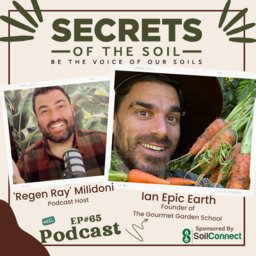We recently had the immense pleasure of hosting David Holmgren, the co-creator of permaculture, on our latest episode of “Secrets of the Soil.” Tune in to Episode 43: Why Permaculture Principles in Your Life will Create a More Sustainable Future, where we dive deep into the transformative impact of permaculture on society and our environment.
Sponsored by Soil Connect, this episode is packed with invaluable insights into creating sustainable lifestyles and resilient communities.
Here are three key takeaways for you:
🔍 Observe and Interact: Start your permaculture journey by engaging directly with your environment. David Holmgren emphasizes the principle of ‘observe and interact’ as a starting point for growing food and understanding nature, negating the need for formal education.
🌿 Resource Re-use: We have an abundance of resources such as stainless steel that can be repurposed creatively. Re-energizing shared households and communities can turn them into powerhouses of the nonmonetary economy.
🏡 Self-Reliance & Community Living: There is a burgeoning interest in creating mini oases in suburban areas. Holmgren highlights how small-scale, ethical actions can have a substantial impact—promoting economic self-reliance and reducing dependence on large, often inefficient, systems.
Don’t miss out on this enlightening episode that delves into practical solutions for a more sustainable and resilient future. 🌾
Who is David Holmgren?
David Holmgren is the co-originator of the permaculture concept following publication of Permaculture One, co-authored with Bill Mollison in 1978.
David is globally recognised as a leading ecological thinker, teacher, writer and speaker promoting permaculture as a realistic, attractive and powerful alternative to dependent consumerism.
Other key publications include Permaculture: Principles and Pathways Beyond Sustainability (2002) and Future Scenarios: How Communities Can Adapt To Peak Oil and Climate Change (2009) and RetroSuburbia: The Downshifter’s Guide to a Resilient Future (2018).

In the latest episode of the “Secrets of the Soil” podcast, host Regen Ray Milidoni delves deep into the world of permaculture with none other than David Holmgren, the co-creator of permaculture. This enlightening discussion covers the historical context of permaculture, the challenges of mainstream agriculture, and the potential of permaculture to solve some of today’s pressing societal problems. Holmgren’s ideas reveal how adopting permaculture principles can lead to a more sustainable and resilient future.
The Genesis of Permaculture
Permaculture emerged in the 1970s, an era marked by environmental turmoil and the search for sustainable alternatives. David Holmgren joined forces with Bill Mollison to co-create permaculture, a revolutionary system that uses ecological principles to design sustainable agricultural and living systems. Their collaborative work laid the foundation for what would become a global movement towards sustainable and regenerative land use.
“The ’70s were a time of environmental awareness, but also turbulence,” Holmgren recalls. “Permaculture was our response to the environmental crises of that period, offering a sustainable alternative to conventional agricultural practices.”
Challenges and Resilience in Permaculture
As the conversation transitioned to the present day, Holmgren and Milidoni touched on the ebb and flow of interest in permaculture. Despite a decline in mainstream interest during the 1980s due to political and societal shifts, permaculture has seen a resurgence as people become increasingly aware of the unsustainable nature of current agricultural practices.
Holmgren explained the significant impact of crises, such as the COVID-19 pandemic, in thrusting the fragility of our food systems into the spotlight. This realization has driven a renewed interest in small-scale, sustainable farming methods and parallel food systems that operate outside of mainstream agriculture.
“Crises often act as a wake-up call,” Holmgren notes. “They expose the vulnerabilities in our current systems and make clear the need for more resilient, localized food production.”
The Power of Observation and Interaction
One of the core principles of permaculture is “observe and interact.” Holmgren believes this principle is crucial for anyone looking to start their journey in permaculture and sustainable living. This concept encourages individuals to engage directly with their environment, make observations, and implement changes based on their findings.
“Formal education can be helpful, but it’s not necessary,” Holmgren asserts. “Engagement and firsthand observation are powerful tools for understanding and working harmoniously with the land.”
The Digital Shift and Permaculture
The COVID-19 pandemic also accelerated a shift to digital learning, opening up opportunities for people to access permaculture courses and resources online. Holmgren discusses the potential and pitfalls of this online migration, including the development of his own online permaculture courses and virtual property tours.
“While technology offers incredible access to information, it also comes with challenges,” Holmgren explains. “It’s about finding the balance between virtual learning and hands-on experience.”
Re-Energising Households and Communities
Holmgren emphasises the inefficiency of large, underutilized houses and advocates for re-energizing shared households to become hubs of community and household economy. This idea aligns with permaculture principles of reusing and repurposing resources to reduce waste.
“There’s already enough stainless steel, enough materials in the world,” Holmgren points out. “It’s about creatively reusing what we have to build self-reliant, resilient communities.”
Ethical Action Over Large-Scale Corporate Solutions
The discussion also covers the limitations of government policies and the importance of small-scale ethical actions. Holmgren argues that individual and community-based initiatives often have a more substantial impact than large corporate or governmental efforts.
“Government policies and corporate strategies often fall short in addressing the root causes of unsustainability,” Holmgren says. “Small-scale, ethical actions can lead to meaningful and sustainable change.”
Case Studies and Practical Skills
Holmgren stresses the value of case studies in understanding practical applications of permaculture. He shares his experiences with self-publishing and experimenting with different formats to document and communicate permaculture principles.
“Case studies provide unique insights into real-life systems,” Holmgren explains. “They’re instrumental in showing the practical application of permaculture principles.”
Radical Solidarity and Resilient Living
Holmgren introduces the concept of radical solidarity, which promotes supporting small-scale actions even if they’re deemed unconventional or illegal. He advocates for practical and useful approaches in activism, emphasizing the importance of modeling holistic ways of living.
“Radical solidarity means standing with those taking ethical, small-scale actions,” Holmgren asserts. “It’s about being the change you want to see and leading by example.”
A Future of Sustainable Land Use
As the episode wraps up, Holmgren shares information about available online resources and courses, encouraging a hybrid approach that combines virtual elements with physical gatherings. This, he believes, is the way forward for educating and inspiring more people to embrace permaculture principles.
“The acceleration of learning practical skills like growing vegetables and ecological building is crucial,” Holmgren concludes. “Especially in a post-COVID world, where people’s values and perceptions of centralized systems have shifted.”
Appreciating the Mystery of Soil
Holmgren and Milidoni remind listeners of the importance of soil—a powerful yet often overlooked component of our ecosystem. Soil’s ability to capture water and nutrients makes it essential for life on land, and regenerative practices can help restore its vitality.
“In soil, we find nature’s innovation at its finest,” Holmgren muses. “It’s the bedrock of fertility and humanity, deserving our appreciation and care.”
Join us in exploring the secrets of soil and the principles of permaculture. Share this podcast episode, stay curious, and continue to discover the transformative power of soil.






